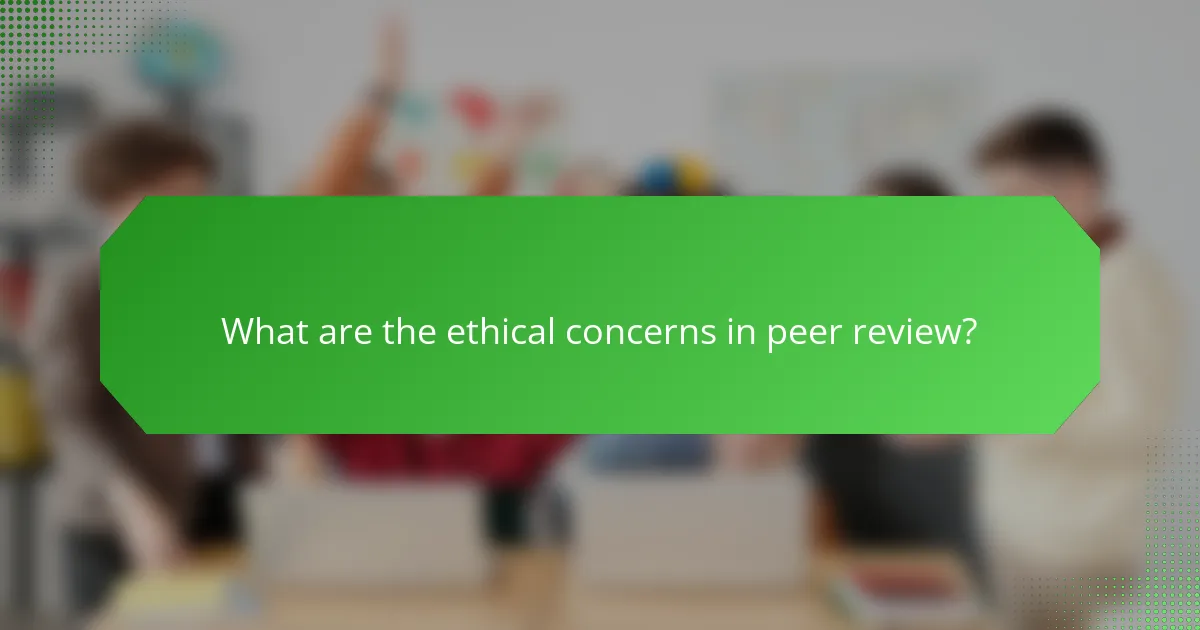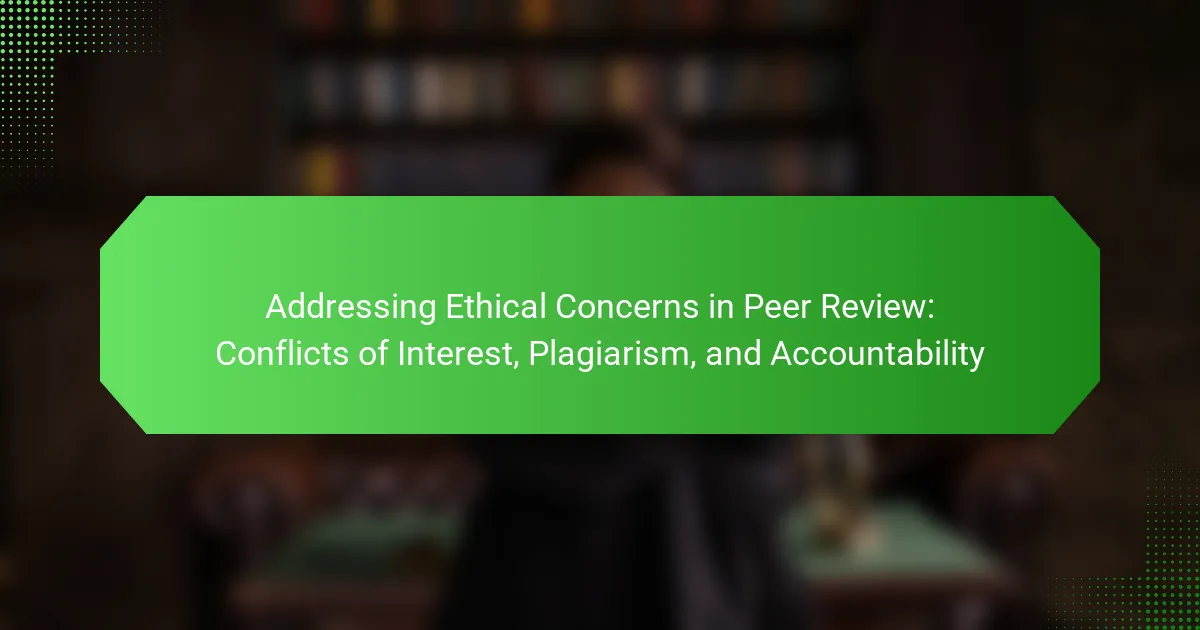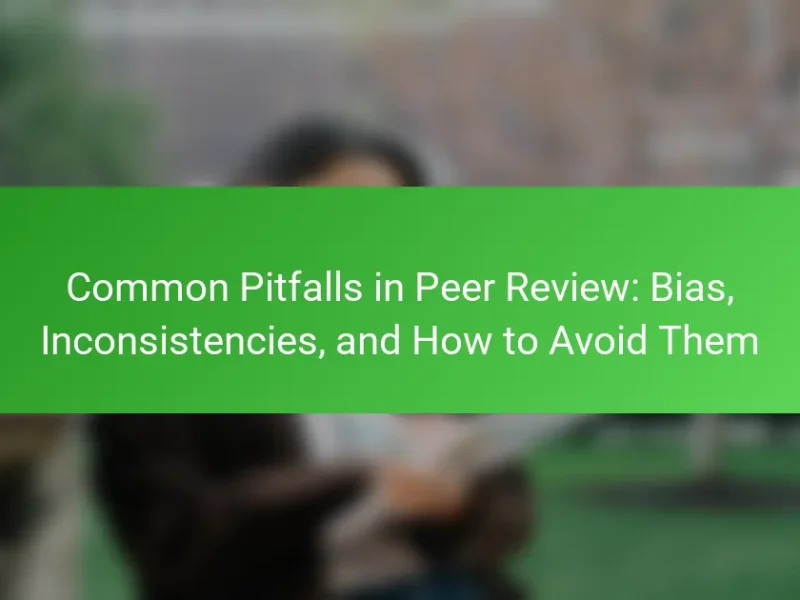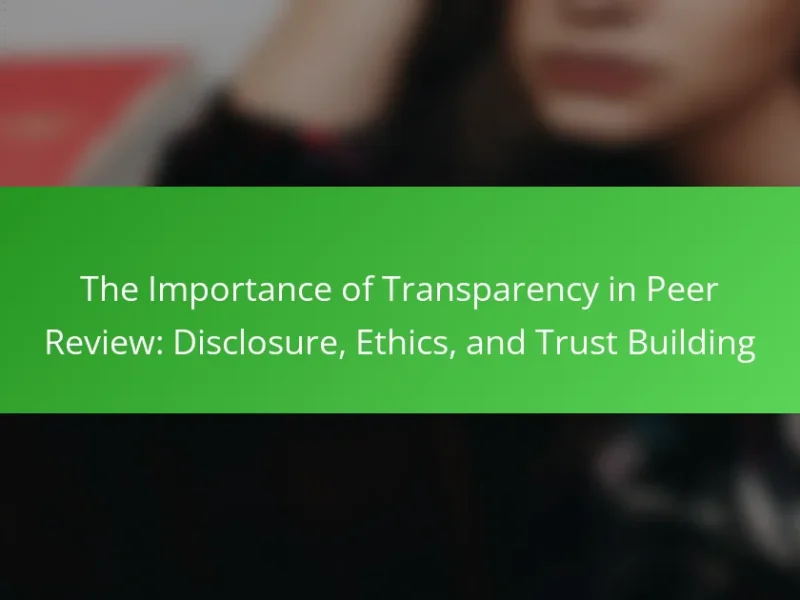The article addresses ethical concerns in the peer review process, focusing on three primary issues: conflicts of interest, plagiarism, and accountability. Conflicts of interest occur when reviewers have personal or financial relationships that may bias their evaluations. Plagiarism involves the need for reviewers to verify the originality of submitted works and identify any copied content. Accountability emphasizes the responsibility of reviewers to provide fair and constructive feedback. The discussion highlights the importance of transparency and adherence to ethical standards in enhancing the integrity of peer review.

What are the ethical concerns in peer review?
Ethical concerns in peer review include conflicts of interest, plagiarism, and accountability. Conflicts of interest arise when reviewers have personal or financial ties to the work being evaluated. This can lead to biased assessments and undermine the integrity of the review process. Plagiarism is another significant ethical issue, as reviewers must ensure the originality of the work and report any instances of copied content. Accountability is crucial, as reviewers should be responsible for their evaluations and provide constructive feedback. These concerns are highlighted in studies that emphasize the importance of transparency and ethical standards in the peer review process.
Why is addressing conflicts of interest important in peer review?
Addressing conflicts of interest in peer review is crucial to maintain the integrity of the academic publishing process. Conflicts of interest can lead to biased evaluations, undermining the credibility of research findings. When reviewers have personal, financial, or professional stakes in the work they assess, their judgment may be compromised. This can result in unfair advantages for certain authors or the rejection of high-quality work. Studies show that transparency regarding conflicts of interest enhances trust in peer review. According to a 2019 study published in the Journal of Medical Ethics, disclosing conflicts improves the perceived fairness of the review process. Therefore, addressing these conflicts is essential for ensuring objectivity and fairness in scholarly communication.
What constitutes a conflict of interest in the peer review process?
A conflict of interest in the peer review process occurs when a reviewer has a personal or financial stake in the outcome of the review. This can include relationships with the authors, financial investments, or competitive interests. Such conflicts may compromise the objectivity of the review. For instance, if a reviewer is a colleague or collaborator of the authors, their judgment may be biased. Transparency about these relationships is essential to maintain integrity in the process. Journals often require reviewers to disclose potential conflicts before accepting a review assignment. This practice ensures that the peer review remains fair and unbiased.
How can conflicts of interest impact the integrity of peer review?
Conflicts of interest can significantly undermine the integrity of peer review. They may lead to biased evaluations of a manuscript. Reviewers with conflicts might favor their own work or that of colleagues. This bias can result in unfair advantages in publication opportunities. Studies show that perceived conflicts can diminish trust in the peer review process. For instance, a 2017 survey found that 35% of researchers believe conflicts of interest compromise review quality. Such perceptions can discourage authors from submitting to certain journals. Ultimately, these conflicts can erode the credibility of scientific literature.
What role does plagiarism play in ethical peer review?
Plagiarism undermines the integrity of the peer review process. It violates ethical standards by presenting someone else’s work as original. This misrepresentation can lead to the acceptance of flawed research. Ethical peer review requires transparency and honesty in authorship. Detecting plagiarism is essential to maintain trust in scholarly communication. Studies show that plagiarism can significantly impact journal reputation. Ethical guidelines mandate reviewers to report any suspected plagiarism. Addressing plagiarism ensures that published work is credible and reliable.
How is plagiarism defined within the context of academic publishing?
Plagiarism in academic publishing is defined as the unauthorized use or representation of someone else’s work as one’s own. This includes copying text, ideas, or data without proper attribution. Academic institutions and publishers enforce strict guidelines against plagiarism. These guidelines aim to uphold integrity and originality in scholarly work. Notably, the Committee on Publication Ethics (COPE) provides resources to help identify and address plagiarism. Violations can lead to retraction of published works and damage to the author’s reputation. Thus, proper citation practices are essential to avoid plagiarism in academic publishing.
What are the consequences of plagiarism for authors and reviewers?
Plagiarism has serious consequences for both authors and reviewers. For authors, it can lead to retraction of published work. This damages their reputation and credibility in the academic community. Additionally, authors may face disciplinary actions from their institutions. These actions can include loss of funding or employment.
Reviewers also face repercussions for failing to identify plagiarism. They may encounter damage to their professional reputation. If a reviewer is found complicit, they could lose their position in the peer review process. Institutions may also impose penalties on reviewers who overlook ethical breaches.
Overall, plagiarism undermines the integrity of academic work for both parties involved.
How can accountability be enforced in the peer review process?
Accountability in the peer review process can be enforced through several mechanisms. Implementing clear guidelines for reviewers is essential. These guidelines should outline expectations regarding conflicts of interest and confidentiality. Regular training sessions can help reviewers understand their responsibilities. Journals can also require disclosures of potential conflicts from both authors and reviewers. Tracking reviewer performance through metrics can provide insights into reviewer reliability. Additionally, establishing a system for reporting unethical behavior can encourage accountability. Transparency in the review process, such as open peer review, can further enhance accountability. Research indicates that these practices improve the integrity of the peer review system.
What mechanisms exist to ensure accountability among reviewers?
Accountability among reviewers is ensured through several mechanisms. These include double-blind review processes, where both authors and reviewers remain anonymous. This anonymity reduces bias and promotes fairness in evaluations. Additionally, editorial oversight is crucial. Editors are responsible for monitoring reviewer performance and ensuring adherence to ethical standards.
Conflict of interest disclosures are another mechanism. Reviewers must declare any potential conflicts, allowing editors to make informed decisions about reviewer assignments. Furthermore, many journals implement a system of reviewer feedback and ratings. This feedback can influence future reviewer assignments and maintain quality standards.
Lastly, ethical guidelines and training programs are established to educate reviewers on their responsibilities. Journals often require adherence to codes of conduct that outline expected behaviors. Together, these mechanisms create a structured environment that promotes accountability among reviewers.
How can institutions promote accountability in peer review practices?
Institutions can promote accountability in peer review practices by implementing transparent guidelines and robust training for reviewers. Establishing clear criteria for evaluation ensures consistency and fairness. Regular audits of the peer review process can identify areas for improvement. Institutions should encourage open communication between authors and reviewers to address conflicts and concerns. Providing a platform for reporting unethical behavior fosters a culture of integrity. Additionally, recognizing and rewarding high-quality peer review can motivate reviewers to adhere to best practices. These measures collectively enhance the credibility of the peer review process, ultimately leading to more reliable research outcomes.
How do ethical concerns in peer review relate to the publication process?
Ethical concerns in peer review significantly impact the publication process. They ensure the integrity and quality of scholarly work. Conflicts of interest can bias reviewers, affecting their objectivity. This can lead to unfair evaluations and potential rejection of valid research. Plagiarism undermines the credibility of published work. It can result in retractions and damage to authors’ reputations. Accountability in peer review fosters trust in the publication process. Journals implementing rigorous ethical standards enhance the reliability of their content. Overall, addressing these concerns is crucial for maintaining scientific integrity.
What are the best practices for mitigating ethical concerns in peer review?
Best practices for mitigating ethical concerns in peer review include ensuring transparency throughout the process. Reviewers should disclose any potential conflicts of interest. This practice helps maintain objectivity in evaluations. Journals can implement double-blind review processes to further reduce bias. Clear guidelines should be established for authors and reviewers regarding plagiarism. Regular training on ethical standards is essential for all participants. Adopting a standardized checklist can enhance the consistency of reviews. Finally, journals should promote accountability by providing avenues for reporting unethical behavior. These practices collectively strengthen the integrity of the peer review process.
How can authors and reviewers collaborate to uphold ethical standards?
Authors and reviewers can collaborate to uphold ethical standards by maintaining open communication throughout the peer review process. Authors should disclose any potential conflicts of interest upfront. This transparency allows reviewers to assess the credibility of the work. Reviewers must provide unbiased evaluations based on the merit of the manuscript. They should refrain from using information from the submission for personal gain. Both parties should adhere to guidelines set by their respective institutions and journals. Regular training on ethical standards can also enhance awareness and compliance. Studies have shown that clear guidelines and communication reduce instances of misconduct in academic publishing.
What resources are available for understanding ethical peer review practices?
Resources for understanding ethical peer review practices include guidelines from organizations like the Committee on Publication Ethics (COPE). COPE provides a comprehensive set of ethical guidelines for peer reviewers. The American Psychological Association (APA) also offers resources on ethical peer review practices in its publication manual. Additionally, the International Committee of Medical Journal Editors (ICMJE) outlines best practices for peer review in medical publishing. Scholarly articles and books on research ethics further elaborate on these practices. For example, “Peer Review and Manuscript Management in Scientific Journals” by Brian Paltridge and Sue Starfield discusses ethical considerations in detail. These resources collectively enhance understanding of ethical peer review practices.
What steps can researchers take to ensure ethical compliance in their submissions?
Researchers can ensure ethical compliance in their submissions by adhering to established guidelines and best practices. They should familiarize themselves with the ethical standards set by relevant organizations, such as the Committee on Publication Ethics (COPE). Researchers must obtain necessary approvals from institutional review boards (IRBs) when applicable. They should disclose any potential conflicts of interest to maintain transparency. Proper citation of sources is essential to avoid plagiarism. Researchers must ensure the originality of their work and refrain from submitting the same manuscript to multiple journals simultaneously. They should also engage in open dialogue with co-authors about ethical considerations. Following these steps promotes integrity and accountability in the research process.
The main entity of the article is the ethical concerns in the peer review process, specifically focusing on conflicts of interest, plagiarism, and accountability. The article examines how conflicts of interest can bias evaluations, the significance of maintaining originality to prevent plagiarism, and the mechanisms for enforcing accountability among reviewers. It highlights the impact of these ethical issues on the integrity of scholarly communication and offers best practices for researchers and reviewers to uphold ethical standards. Additionally, it discusses resources available for understanding ethical peer review practices and the steps researchers can take to ensure compliance.


